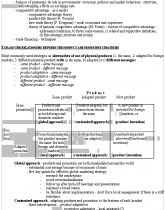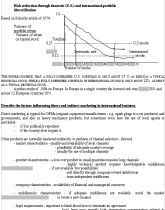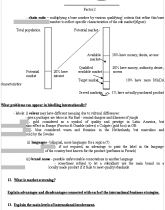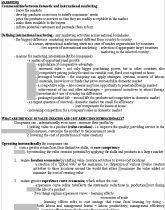Vypracované otázky: International marketing - otázky
Skrýt detaily | Oblíbený- Kvalita:82,0 %
- Typ:Vypracované otázky
- Univerzita:Masarykova univerzita
- Fakulta:Ekonomicko-správní fakulta
- Kategorie:Ekonomika
- Podkategorie:Management
- Předmět:Mezinárodní management a marketing
- Autor:eliskabila
- Rozsah A4:28 strán
- Zobrazeno:965 x
- Stažené:1 x
- Velikost:0,2 MB
- Formát a přípona:MS Office Word (.doc)
- Jazyk:český
- ID projektu:2480
- Poslední úprava:06.12.2013
1. Explain commonalities and specifics of international marketing in relation to domestic marketing.
Commonalities between domestic and international marketing
- know the markets
- develop products or services to satisfy consumers´ needs
- price the products or services so that they are readily acceptable in the market
- make them available to the buyers
- inform potential customers and persuade them to buy
Defining international marketing - any marketing activities across national boundaries.
- the biggest difference: marketing environment different from country to country
- in a sense, international marketing starts as a case of market segmentation by countries
- two aspects of international marketing: - selection of appropriate target countries
- marketing in the selected country
- reasons for marketing internationally(for companies):
- a matter of opportunity and growth
- exploitation of comparative advantage
- increased sales – not only bigger purchasing power, but in other countries also competitive pricing policy focused on variable cost, fixed cost captured at home
- leveraged benefits – the company can apply strategies, systems, sources of labour, materials, know-how or funds that prove successful in domestic market
- a competitive edge – late-comers may lose opportunity to penetrate foreign market
- achievement of tax and other advantages – government incentives to attract foreign investments + use of country tax differences
- prolonged product life – second life for products not competitive in domestic market
- an urgent question of survival - domestic market too small for efficiency
- can compensate for losses at home
- increasing competition for a company's sales in domestic market
What are the ways of value creation and cost reduction internationally?
Companies can - internationally even more - increase their profits by:
1. adding value to a product (value creation) - i.e. improve the quality, providing service to the consumer, customise the product to the consumer's needs
2. lowering the cost of production (of value creation)
Operating internationally the companies can:
1. earn a greater return from their distinctive skills, or core competency
- by extending the value creation potential by applying the skills and products in a larger market
2. realise location economies by shifting value creation activities to lower-cost locations
- a creation of a "global web" as the maximum, i.e. dispersion of various value creation activities to those locations around the world that either maximise the value added or minimise the cost of creating value
3. realise greater experience curve economies, which reduce the cost
- experience curve refers to/reflects the systematic reductions in production cost during the life of a product
- two things explain experience curve: - learning effects
- economies of scale
- learning effects refer to cost savings that come from learning by doing - both labour and management learns = labour productivity, management efficiency - learning effects typically die out after a period of time
- scale economies - reductions in unit cost by producing a large volume
- basis: ability to spread fixed costs over a large volume
- not only machinery, premises, etc. - also RD
Commonalities between domestic and international marketing
- know the markets
- develop products or services to satisfy consumers´ needs
- price the products or services so that they are readily acceptable in the market
- make them available to the buyers
- inform potential customers and persuade them to buy
Defining international marketing - any marketing activities across national boundaries.
- the biggest difference: marketing environment different from country to country
- in a sense, international marketing starts as a case of market segmentation by countries
- two aspects of international marketing: - selection of appropriate target countries
- marketing in the selected country
- reasons for marketing internationally(for companies):
- a matter of opportunity and growth
- exploitation of comparative advantage
- increased sales – not only bigger purchasing power, but in other countries also competitive pricing policy focused on variable cost, fixed cost captured at home
- leveraged benefits – the company can apply strategies, systems, sources of labour, materials, know-how or funds that prove successful in domestic market
- a competitive edge – late-comers may lose opportunity to penetrate foreign market
- achievement of tax and other advantages – government incentives to attract foreign investments + use of country tax differences
- prolonged product life – second life for products not competitive in domestic market
- an urgent question of survival - domestic market too small for efficiency
- can compensate for losses at home
- increasing competition for a company's sales in domestic market
What are the ways of value creation and cost reduction internationally?
Companies can - internationally even more - increase their profits by:
1. adding value to a product (value creation) - i.e. improve the quality, providing service to the consumer, customise the product to the consumer's needs
2. lowering the cost of production (of value creation)
Operating internationally the companies can:
1. earn a greater return from their distinctive skills, or core competency
- by extending the value creation potential by applying the skills and products in a larger market
2. realise location economies by shifting value creation activities to lower-cost locations
- a creation of a "global web" as the maximum, i.e. dispersion of various value creation activities to those locations around the world that either maximise the value added or minimise the cost of creating value
3. realise greater experience curve economies, which reduce the cost
- experience curve refers to/reflects the systematic reductions in production cost during the life of a product
- two things explain experience curve: - learning effects
- economies of scale
- learning effects refer to cost savings that come from learning by doing - both labour and management learns = labour productivity, management efficiency - learning effects typically die out after a period of time
- scale economies - reductions in unit cost by producing a large volume
- basis: ability to spread fixed costs over a large volume
- not only machinery, premises, etc. - also RD




